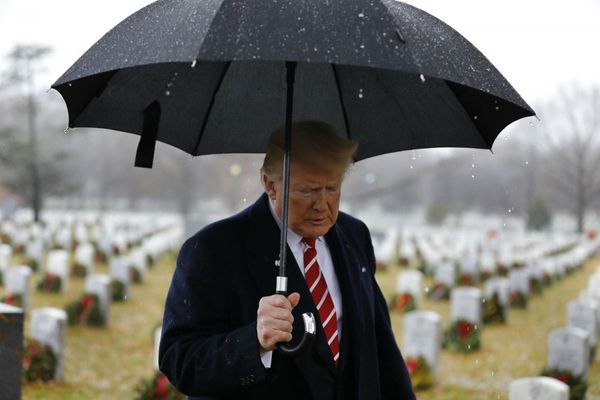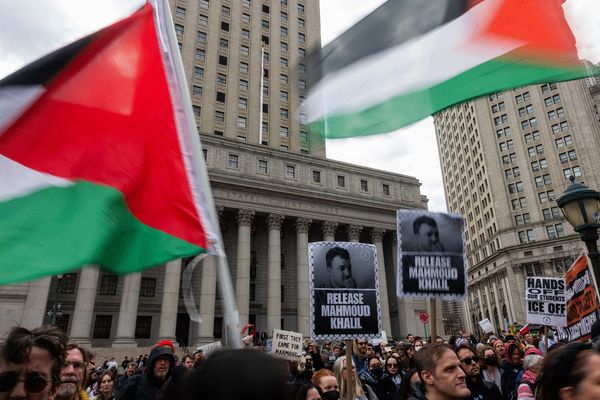
Might Vladimir Putin’s war on Ukraine put a broom through the nationalist-populist extremes of French electoral politics?
The pro-Putinism of three candidates in next month’s presidential elections has made them look like imposters — aspiring emperors, and an empress, suddenly unclothed.
On what might be called a Trumpian-type far right, Putin idolisers Eric Zemmour and Marine Le Pen, and on the far left, firebrand Jean-Luc Mélenchon, have for years sympathised with, excused and even pleaded the cause of Russia’s predatory autocrat.
Their back-pedalling since the invasion has looked opportunistic in the extreme given the depth and breadth of past fidelities.
“Russia feels humiliated, threatened and assaulted,” said Mélenchon as recently as February 10. Le Pen, who once memorably referred to Russia as a democracy, has often expressed her “admiration” for Putin, while Zemmour, perhaps the most ardent of the pro-Putin trio, has said that he “dreams of a French Putin”. (For the record, Zemmour also advocates the racist conspiratorial theory of the “great replacement”; has called it an error to “demonise” Putin’s murderous mate, Bashar al-Assad, and was convicted by a Paris court earlier this year for “inciting racial hatred”).
But France’s Putin idolisers have not only failed to see — or deliberately overlooked? — the imperialist despot lurking behind the mask, they’ve vigorously touted him as a kind of patriotic model. The spurious line that the war is the fault of the West, who provoked the Russian leader by agreeing to expand the intrinsically defensive North Atlantic Treaty Organisation (NATO), is of course the defence that Putin has mounted.
Did Europe fall asleep as the Russian dictator annexed Crimea, snuffed out political opponents and brutally destabilised his neighbours? Perhaps. Certainly many European observers failed to see those satellite photos as preparation for invasion, or insisted that Putin would not make the same mistakes as Leonid Brezhnev in Afghanistan, or that if Putin invaded, nuclear arms at his disposal, he’d readily limit himself to the Donbass to avoid economic sanctions.
But no one save Putin’s “useful idiots” argued that the West provoked Putin into sending tanks across the border based on some maniacal fantasy about “denazifying” a neighbouring country — a little brother nation — with a democratically elected government and a president who just happens to be Jewish.
The signs so far in a short election campaign ahead of first-round voting on April 10 are that French President Emmanuel Macron’s handling of the crisis has given him a boost in the polls.
The “flag effect” — the “necessary patriotism” that draws the electorate to the leader in a crisis — is already present, and will doubtless increase as the war continues. Macron is head of state (if not now technically so because a candidate), war chief and European chief because France has the six-month rotating presidency of the European Union.
But even if, as the polls suggest, Macron wins comfortably after second-round voting on April 24, unmasking the extremes has already offered up at least one major insight. And it has been to debunk the view — common currency across the far right and all-pervading with Zemmour — that the “shock of civilisations” — wherein religion plays a big part — is not the unfailing great paradigm for understanding international relations and conflicts.
As French philosopher Oliver Roy has pointed out, Samuel Huntington’s theorising would suggest that Putin’s invasion of Ukraine is unthinkable. “How could one majority orthodox country want to invade another majority orthodox country?” he wrote in the French magazine L’Obs. As Huntington wrote in 1993: “If the concept of civilisation is the key, then the probability of violence between Russians and Ukrainians should be low.”
This may seem like the pettifogging detail of French electoral politics given the unspeakable horrors playing out in Ukraine. But that in a sense is the point. In much of Europe, and in France in particular, the nationalist-populists have diminished debate over cultural identity to the microscopy of seemingly endless argument around headscarves, burkinis at the beach, and face masks as cultural, political and social “signallers”. This as the monster of Moscow furtively prepared his invasion of the century.
Public opinion polling since the invasion hasn’t changed much. Zemmour has lost two points and Mélenchon a single point (to 12%), according to Politico’s Poll of Polls, but Le Pen is holding at 17%. Macron, it’s true, has jumped four percentage points in a fortnight. Perhaps most unsettling, however, is that the mainstream right candidate, Valérie Pécresse of Les Républicains party, is also on 12 points.
Because if no electoral broom is put through the extremes, if the far right wins through to the final round, the centre-right may well move (yet) further right in the aftermath. Or it may just implode, as did the centre-left Socialist Party when its candidate was trounced at the last presidential election in 2017.
Skinned and butchered, to borrow from conservative heavyweight Xavier Bertrand, picked apart by “the vultures” and “the grave-diggers”, the mainstream right’s demise would means Macron’s hatchet job on the old two-party system was complete.
His progress then will have been at the expense of that system. And it’s hard to see how that’s a good thing, longer term, for the health of democracy in France or in Europe.







